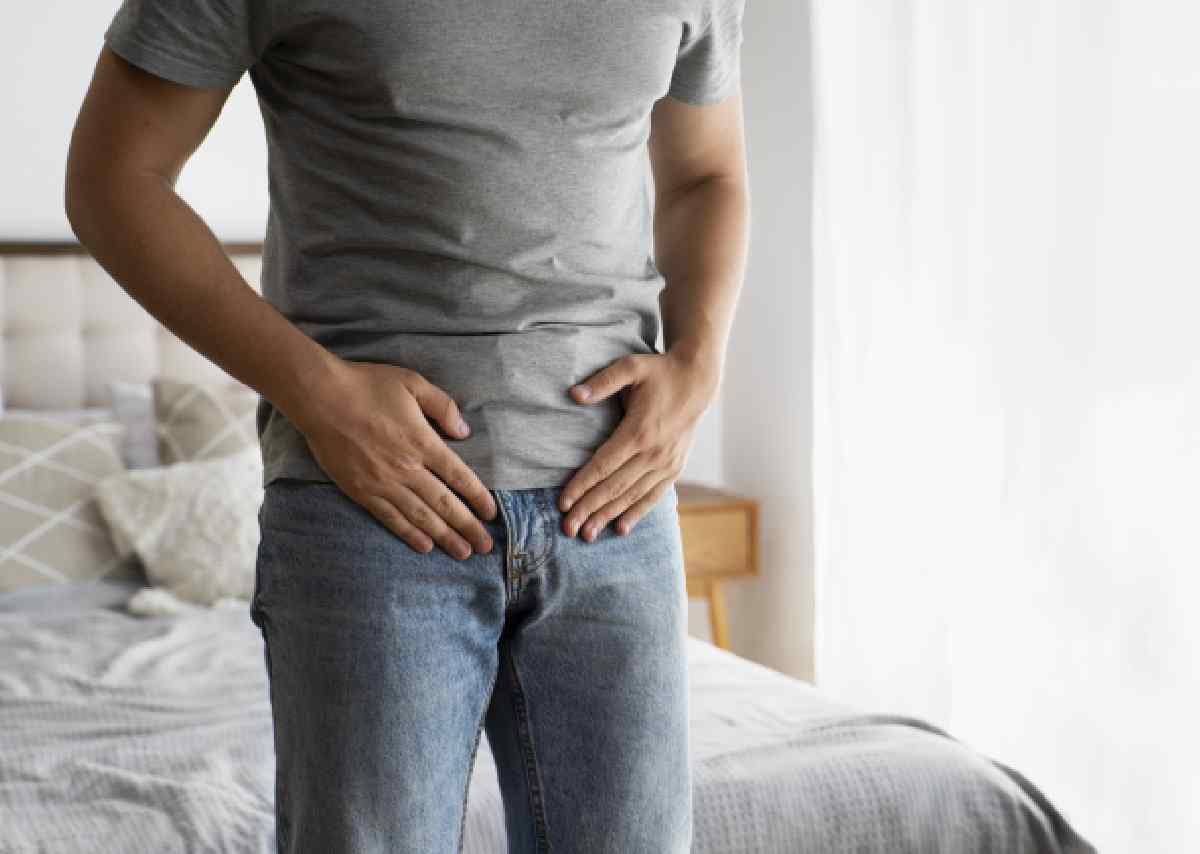Prostate problems are frequent in men and are diagnosed following the analysis. The majority of patients have no idea why they are having these issues.
The prostate is located in the pelvis, below the urinary bladder, surrounds the urethra (urine canal outflow), and weighs approximately 20 grams. A neural network and blood vessels surround it.
The prostate's function is to secrete fluid that is essential for nourishing sperm and its movement (from inside the man before ejaculation until it is inside the woman). Sperm is created in the testicles and delivered through the epididymis. It is kept in the seminal vesicle until ejaculated outside following se-xual activity.
In this blog, Dr. Niren Rao, a urologist in Delhi at Delhi Urology Hospital, is going to discuss what causes pain in the prostate and ways to manage this prostate issue.
Read on to learn more about prostatitis and its treatment in Delhi with Dr. Niren Rao.
What is Prostatitis?
It is a common and painful condition that affects men of all ages. Pain in the pelvis in and around the prostate could be caused by bacteria-caused illness or by inflammation caused by an injury or infection (painful, red, swollen tissue).
What are the Common Causes of Prostate Pain?
Determining the cause of prostatitis or pelvic pain in males is not always possible, and requires help of an experienced urologist. A bladder infection, a catheter, an infection caused after intercourse, or a urinary tract condition can increase the chance of a prostate bacterial infection or pain. It may take several tests by a urologist in Delhi at Delhi Urology Hospital to determine why a man feels discomfort.
A bacterial infection in the prostate causes bacterial prostatitis. When infected urine flows backward from the urethra, bacteria can enter the prostate. A se-xual partner cannot "catch" this form of illness. Bacteria can be detected through urine, prostate fluid, or blood tests.
Stress, nerve inflammation or irritation, trauma, or past urinary tract infections can all result in nonbacterial prostatitis. It could also happen if the body reacts to a previous illness or injury. There is no evidence of bacteria in the urine or seminal fluid in this type of prostatitis.
Other Probable Causes of Prostate Pain Include:
- Abscess of the prostate
- BHP (benign prostatic hyperplasia)
- Urethral constriction
- Prostate cancer
- Bladder cancer.
Should I be Concerned About Occasional Prostate Pain?
Urinary symptoms unrelated to prostatitis may result from bladder issues, UTIs, or benign prostatic hyperplasia. Prostatitis symptoms might potentially indicate more severe illnesses, such as prostate cancer. Men experiencing symptoms of prostatitis should seek medical attention.
Men Experiencing the Following Symptoms Should Seek Emergency Medical Attention:
- Absolute inability to urinate
- Urination is painful, frequent, and urgent, with fever and chills
- Blood in the urine
- Severe gastrointestinal and urinary tract pain or discomfort.
What are the Symptoms of Prostate Problems that I Should Watch out for?
Urinary issues are shared among the early signs and symptoms of prostate dysfunction. These issues can lead a man to do the following:
- Urge to use the loo to relieve oneself
- Urine that passes in drops
- Have a sluggish urine flow
- Have an increased desire to pass urine during the night
- Have difficulty or pain while passing urine
- Even after urinating, one has the impression that the bladder has not emptied properly.
- Men experience recurrent pain or discomfort in the lower abdomen
- Hematuria (blood in the urine)
- Hematospermia (blood in the sperm)
- se-xual dysfunction
Men may experience additional symptoms depending on the underlying prostate problems.
- Prostatitis symptoms in men can include long-term pain or discomfort in the peni-s, scrotum, abdomen, or lower back.
- Men with bacterial prostatitis may be unable to empty their bladders. Infection symptoms such as fever, chills, or body aches may occur.
- Men with BPH may experience frequent urination during the night. Men's urine may have an unusual colour or odour. Urination, or ejaculation, can be uncomfortable.
- To avoid the progression of prostate problems, visit a doctor if a person experiences any of the above-listed signs and symptoms.
When Should I Seek Medical Attention for Prostate Pain?
Prostatitis symptoms are severe and occur unexpectedly. Seek immediate medical assistance if men suffer the following symptoms:
- Burning or discomfort while urinating
- Bodily aches
- Inability to empty the bladder
- Fever and chills
- Abdominal or lower back pain
- Blood in the urine or sperm
- Foul-smelling urine
- Ejaculation pain
- Bowel movement discomfort.
Pain in the following areas:
- Between genitalia and anus
- Testicles
- Pubic bone.
Men should consult a doctor if any of the following symptoms persist for more than a few days:
- Have difficulty urinating, either starting or having a weak stream.
- Feel they have a UTI.
- Have a frequent urge to urinate or need to urinate two or three times during the night.
In addition, patients may detect an unpleasant odour or blood in the urine or sperm. Or if one gets acute pain in the lower abdomen or during urinating. These symptoms could indicate a prostatitis infection.
Are there any Lifestyle Changes I can Make to Alleviate Prostate Pain?
Weight loss and nutrition adjustments, and learning to relax and exercise may help alleviate symptoms. A doctor may advise men to stop eating and drinking certain foods. It may include spicy or acidic foods and caffeinated, fizzy, or alcoholic beverages. Aim to drink more water, eat more fresh or unprocessed foods, and consume less sugar. A healthcare practitioner may advise patients to avoid activities that aggravate the pain (such as cycling).
Additional Lifestyle Changes that can Ease Prostate Pain Include:
- Maintain good hygiene. To avoid infection, keep the peni-s and the area around it clean.
- When possible, stand up. Long stretches of sitting increase pressure on the prostate gland, which inflames it gradually. Avoid long bike rides and sitting for extended periods.
- Get yourself moving. Schedule exercise at least three times per week. Get moving by walking briskly around the park, stretching, or going to the gym for a cardio session. Physical activity can help lower anxiety, which has been linked to some kinds of prostatitis. Men who have an irritated prostate report that exercising helps them feel better.
- Hydrate. Some types of prostatitis are induced when bacteria in the urinary tract enter the prostate and cause inflammation. Stay hydrated to keep the urine diluted and the bladder flushed. If a man has a pre-existing medical condition, such as chronic kidney disease or congestive heart failure, he should consult his doctor about any extra measures he should take.
What are the Treatment options available for Managing Prostate Pain?
Treatment for prostatitis in Delhi varies according to the cause and type. Asymptomatic inflammatory prostatitis does not necessitate treatment.
- Urinary: Drugs are prescribed that help ease the muscles surrounding the prostate and bladder to increase urine flow.
- Psychosocial: Stress management can be beneficial. Some men benefit from counselling or medication for anxiety, despair, and catastrophizing (an overreaction to mild stimuli that is frequent in people with chronic pain).
- Organ: Supplements containing quercetin and bee pollen may help ease a swollen, irritated prostate gland.
- Infection: Antibiotics eliminate bacteria that cause illness or disease. Antibiotics can kill bacteria that cause bacterial prostatitis. Men with acute bacterial prostatitis may require antibiotics for 14 to 30 days, beginning with IV antibiotics in the hospital. Men rarely require surgery to remove a prostate abscess.
- Neurologic: Neurogenic pain is relieved by prescription pain medications. Fibromyalgia and pain that extends into the legs, limbs, or back are examples of this pain.
- Tenderness: Myofascial release (soft massage to relieve tension in tight pelvic floor muscles) may be used in pelvic floor physical therapy. Muscle spasms can be reduced or eliminated using this therapy.
Note:
Chronic bacterial prostatitis is difficult to treat. Men may require up to three months of antibiotics to sterilise the prostate. If the prostate cannot be sterilised, long-term administration of low-dose antibiotics can be employed to avoid recurrences. Some men require surgery to remove prostate stones or urethral scar tissue. Surgeons remove all or part of the prostate gland (prostatectomy).
Can Prostate Pain be a Sign of a More Serious Condition?
- Prostatitis is a non-cancerous condition. It does not raise the risk of developing prostate cancer. Prostatitis-induced inflammation, on the other hand, boosts the level of prostate-specific antigens (PSA) in the blood, just like prostate cancer. Additional testing can be used to discover what is causing the increased PSA levels.
- Sepsis can develop in men with acute bacterial prostatitis. This extensive inflammation has the potential to be fatal. It necessitates immediate medical attention.
- Antibiotics might induce stomach problems. Men who have chronic bacterial prostatitis may require a large number of drugs to cure repeated infections. Antibiotic resistance develops in some people, rendering treatment ineffective.
- Asymptomatic inflammatory prostatitis can reduce sperm count and impact fertility.
Are there any natural remedies or supplements that can help with prostate pain?
In addition to seeking medical attention, a person may try home remedies to ease symptoms. These can be combined with medical treatment.
- Bathing or showering in warm water
- Avoiding exercises like bicycling that exert strain on the prostate
- Avoiding alcohol
- Sitting on a cushion
- Restricting or avoiding the intake of spicy foods
- Consuming plenty of caffeine-free fluids.
What preventive measures can I take to maintain good prostate health and minimise the risk of pain?
- Consume more fruits and vegetables. They are high in nutrients that keep the body healthy and aid in the fight against infections and inflammation.
- Order cuisine that is on the mild side. There is no evidence that certain meals can prevent prostatitis. However, spicy meals, hot peppers, and chilli irritate the bladder and exacerbate prostatitis symptoms.
- Caffeine and alcohol should be avoided. Tea, coffee, and soda can cause urinary tract and bladder inflammation. Alcoholic beverages can do the same.
- Keep a healthy weight. Being overweight is unhealthy for the prostate. Lose weight by eating a good diet, staying active, and getting enough sleep.
- Control your stress levels. Men who experience high-stress levels at work or home are likelier to develop prostatitis. Consult a therapist to help control the emotions. Men might explore meditation or a relaxation method such as complete body relaxation. It teaches how to relax the body and mind by releasing physical tension.
- se-x should be done safely. Prostatitis can be caused by se-xually transmitted infections (STIs). Bacteria can enter the urethra when men have intercourse with an infected partner and do not use a condom. That is the tube that transports urine from the body. These germs could end up in the prostate.
Get the best treatment for prostatitis in New Delhi, India, with Dr. Niren Rao at Delhi Urology Hospital.
He treats all issues related to the urinary tract and male reproductive systems. Each type of prostatitis requires different treatment, and Dr. Niren Rao can determine the exact cause and symptoms and give answers for one’s condition. The prostrate infection treatment in Delhi will depend on the patient's symptoms, lab tests, and findings during their visit.
Visit Delhi Urology Hospital to learn more!




